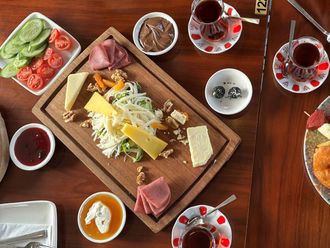In early summer 2008, my friend and I decided it was time for us to escape London for a while. Some friends suggested house-sitting, so we registered our details with www.housecarers.com, a website that put property owners in touch with potential sitters. A few months passed without anything suitable coming up but in autumn we found our dream scenario: three months looking after a rural B&B in Puglia, southern Italy, that was closed for the winter while its owners, Leonie and Paolo, visited family in Australia. We would be working but it looked like an extended, yet inexpensive holiday.
A month later, we were being shown around our new home, the beautiful Masseria La Rascina.
The B&B — a rather modest title for the luxurious six-bedroom masseria (farmhouse), with four self-catering apartments, swimming pool and lush gardens set in the middle of a 1,000-year-old olive grove — is a 20-minute drive from Ostuni, the medieval Pugliese hill town known as La Citt Bianca (White City) for its brilliant, whitewashed buildings. Travel ten minutes in the other direction and you reach the beaches of Puglia's Adriatic coast, deserted and unkempt off-season but picturesque nonetheless.
Set out on foot and you are immediately surrounded by gnarled, ancient olive trees that provide greener and more deliciously peppery oil than any we had tasted. Bone dry in the fiercely hot summer months, the fields around La Rascina are transformed into lush green wildflower meadows in the winter.
As well as keeping watch over the B&B, we were charged with looking after the family pets: two dogs, Rudy, an elderly boxer and Doris, a former stray; and two extremely independent cats.
Most household tasks, including cleaning and laundry, were taken care of by La Rascina's dedicated housekeeper, Irene. Left the keys of Leonie and Paolo's battered white Renault Twingo, we were able to take day trips to places such as Gallipoli, Lecce and Alberobello, the nearby town famous for its typical Pugliese cone-shaped trulli houses.
We did all our shopping in Ostuni, using the local shops as well as the couple of smallish supermarkets. The abundance of local and regional delicacies such as burrata — mozzarella blended with cream and encased in more mozzarella — and fresh orecchiette pasta turned us into unashamed gluttons.
We went out for sumptuous meals in the dozens of wonderfully romantic restaurants dotting the surrounding countryside, many serving the local speciality of raw seafood antipasti: peeled prawns dressed only with olive oil and sweet red peppercorns; noci (small clams) served on the half-shell with a squeeze of lemon; finely sliced carpaccio of octopus.
We were also introduced to friends of Leonie and Paolo's in the days before their departure, who invited us to dinners and parties, and advised us on the best places to eat, shop and visit.
Getting to know these kind and generous people meant that we left Puglia with a much more complete impression of southern Italian life than we would have had otherwise.






